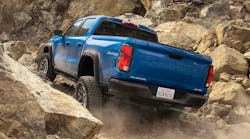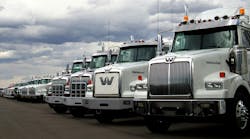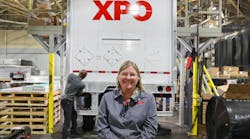MANAGER: Tom Hopkins
TITLE: Distribution and fleet manager
FLEET: Wright & Filippis, Rochester Hills, MI
OPERATION: Medical home delivery service
PROBLEM:
It's one thing to talk about converting a fleet operation to run on an alternative fuel; it's quite another to actually do it. That's the conundrum Wright & Filippis faced when it started to contemplate switching over to a non-petroleum fuel this past April for its fleet operation.
Wright & Filippis is a medical home delivery operation, dropping off everything from wheelchairs to hospital beds, primarily in Michigan (though it maintains a small operation that serves Toledo, OH). In all, the fleet racks up 975,000 mi. annually.
Altogether, the Wright & Filippis fleet numbers 160 vehicles; 60% are passenger cars, and 40% are light-duty trucks comprised mainly of Ford E-350 cargo vans and cutaway chassis fitted with 15- to 16-ft. cargo bodies.
While 50 of the company's vehicles are maintained by leasing firm PHH, the rest — trucks included — rely on the skills of a single in-house technician based out of one shop at the company's Rochester Hills main office for upkeep. So switching the fleet's vehicles over to an alternative fuel could potentially impact how that technician keeps the fleet up and running, and how the fleet delivers its vital payloads.
SOLUTION:
For Tom Hopkins, distribution and fleet manager for Wright & Filippis, the solution proved pretty easy — make the fleet's technician an integral part of the company's alternative fuel plan.
After examining several different aftermarket alternative fuel vehicle conversion kits, Wright & Filippis selected the Roush CleanTech dedicated liquid-propane injection fuel system conversion kit for an initial order of 12 E-350 trucks to be delivered in stages through the end of 2011. The decision to go with propane, though, was not made without the input of the company's technician.
“Our analysis is that the propane fuel injection system works best with the existing gasoline-style engine we already use in our trucks, retaining the familiarity of the vehicles our technician works on,” Hopkins says. “Roush even brought him down to their Livonia [Michigan] plant to watch the vehicle conversion process from start to finish so he could get a more thorough understanding of the propane system layout.”
Wright & Filippis is also working with Ferrellgas to install a 1,000-gal. propane refueling station onsite at Wright's central distribution facility to increase overall vehicle efficiency during the transition to the new fuel.
Yet for Wright & Filippis, the choice of propane was made easier when the benefits of obtaining longer intervals for engine-related maintenance, especially oil changes, were factored into the equation. Though it received a grant through the Ann Arbor Clean Cities program to help defray the higher cost of going with propane-powered trucks, the fleet still needed maintenance savings to offset the higher operating costs.
“While propane costs 30 to 40% less than gasoline, we're going to lose about 10 to 11% in fuel economy running on propane,” Hopkins explains. “We're looking to make up the difference through maintenance savings on the vehicle.”
Overall, Hopkins expects a boost in the company's bottom line from its first propane vehicle, deployed just at the end of November this year. “Again, we feel the clean-burning propane will greatly reduce our maintenance cost and extend our engine life, which will naturally increase the lifecycle of the vehicle,” he explains.


